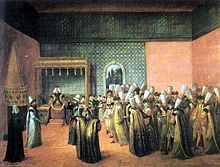- Divan
-
For the piece of furniture also known as divan, see Divan (furniture).For other uses, see Diwan (disambiguation).
 Audience in the Diwan-i-Khas granted to the French ambassador, the vicompte d'Andrezel by Sultan Ahmed III, 10 October 1724, in a contemporary painting by Jean-Baptiste van Mour.
Audience in the Diwan-i-Khas granted to the French ambassador, the vicompte d'Andrezel by Sultan Ahmed III, 10 October 1724, in a contemporary painting by Jean-Baptiste van Mour.
A divan (Persian: دیوان, dīwān) was a high governmental body in a number of Islamic states, or its chief official (see dewan).
Contents
Etymology
The word is recorded in English since 1586, meaning "Oriental council of state," from Turkish divan, from Arabic diwan, is a Middle-Persian loan-word in Arabic and was borrowed also at an earlier date into Armenian[1] dīvān "bundle of written sheets, small book, collection of poems" (as in the Divan-i Hafiz), related to debir "writer." Sense evolved through "book of accounts," to "office of accounts," "custom house," "council chamber," then to "long, cushioned seat," such as are found along the walls in Middle Eastern council chambers. The modern French, Spanish, Italian words douane, aduana, dogana respectively (meaning "customs") also come from diwan.
Council
The word first appears in the ninth-century descriptions of the caliphate of Omar I (A.D. 634-644). Great wealth, gained from the Muslim conquests, was pouring into Medina, and a system of business management and administration became necessary. This was copied from the Persians (whose Sassanid empire was being conquered and islamised under Umar) and given the Persian name divan. Later, as the state became more complicated, the term was extended over all the government bureaus.
The divan of the Sublime Porte was for many years the council of the Ottoman Empire. It consisted of the Grand Vizier, who presided when the Sultan was absent, and other viziers, kazaskers, nisanci, defterdar, and occasionally the Janissary Ağa.
The Assemblies of the Danubian Principalities under Ottoman rule were also called "divan" (see Akkerman Convention, ad hoc Divan).
In Javanese and related languages, the cognate Dewan is the standard word for chamber, as in the Dewan Perwakilan Rakyat or Chamber of People's Representatives.
Ministerial departments
In the sultanate of Morocco, several portfolio Ministries had a title based on Diwan:
- Diwan al-Alaf: ministry of War.
- Diwan al-Bar: 'ministry of the Sea', i.e. (overseas=) Foreign ministry.
- Diwan al-Shikayat (or - Chikayat): ministry of Complaints.
Halls
"Divan" refers to two types of palatial buildings in Indian courts. They tend to occur in pairs in the Mughal imperial capitals; the most famous ones are in Agra Fort, but there are others in Red Fort, Delhi and Fatehpur Sikri and certain other princely capitals such as Amber and also in Lahore Fort Pakistan.
Dīwān-e-Ām
(Persian ديوان عام), also Divan-i-Aam. The court's Hall of Public Audience, where the ruler held mass audience. He would sit on his throne facing petitioners. His minister would assemble the petitions and refer them to the Dīwān-e-Khās for private audience.
Dīwān-e-Khās
(Persian ديوان خاص). A court's Hall of Private Audience, smaller than the Dīwān-e-Ām. Here envoys and other honored guests were granted a personal audience with the ruler. At Agra, the Dīwān-e-Khās was a small red sandstone building near the Dīwān-e-Ām.
Other Uses
West-Eastern Divan Orchestra
The West-Eastern Divan Orchestra is a youth orchestra consisting of musicians from countries in the Middle East, bringing together young musicians from Egypt, Iran, Israel, Jordan, Lebanon, Palestine, and Syria. It was founded in 1999 by the Argentine-Israeli conductor Daniel Barenboim and the late Palestinian-American academic and author Edward Said.
Sources and references
- ^ François de Blois, "Divan", Encyclopaedia Iranica; accessed February 10, 2007
 This article incorporates text from a publication now in the public domain: Chisholm, Hugh, ed (1911). Encyclopædia Britannica (11th ed.). Cambridge University Press.
This article incorporates text from a publication now in the public domain: Chisholm, Hugh, ed (1911). Encyclopædia Britannica (11th ed.). Cambridge University Press.- EtymologyOnLine
- RoyalArk- here Morocco
Categories:- Politics of the Ottoman Empire
- Tourism in Agra
- Agra Fort
- Persian loanwords
- Persian words and phrases
Wikimedia Foundation. 2010.

